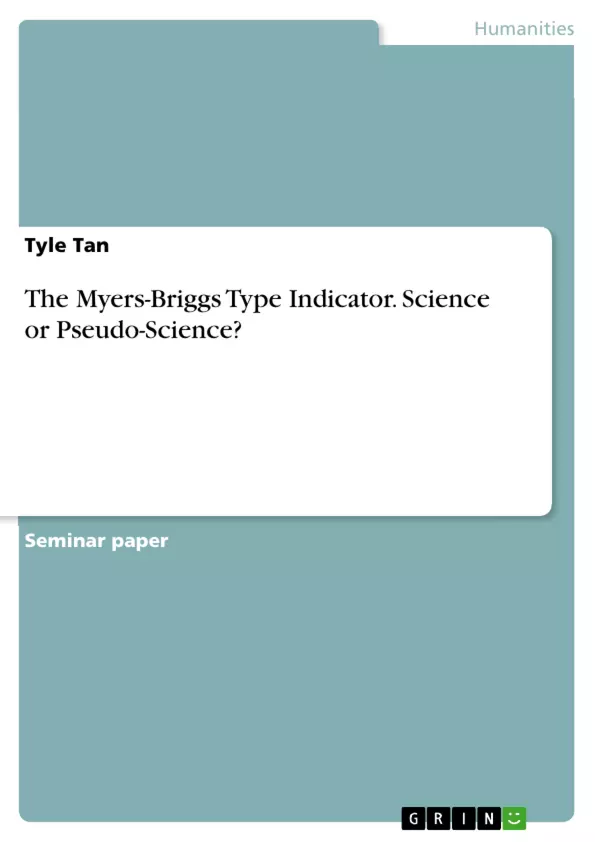The Myers-Briggs Type Indicator (MBTI) is both a theory and a self-report questionnaire designed to measure how people perceive the world based on their beliefs. Based largely on Carl Jung’s psychological types and Isabel Myers Briggs’s theory, it describes the various personality types in the world by compiling their beliefs, providing a meaningful description of the various types.
The types would refer to a combination of functions such as Extroverted-Introverted (E-I), Intuitive-Sensing (I-S), Thinking-Feeling(T-F) and Judging-Perceiving(J-P) dichotomies , resulting in a type (e.g. ENTJ), this derived type can then be used to predict various beliefs and behaviours. It is commonly understood that these beliefs and behaviours constitute a personality.
This paper investigates if the Myers and Briggs type indicator is science or pseudo science, and also investigates how such knowledge was constructed.
Table of Contents
- Introduction
- Objectives
- Construction of knowledge via the MBTI
- The Natural-Scientific Method in the Social Sciences
- Knowledge of the Individual's type via the hypothetico-deductive Method
- Nature of Knowledge derived from the MBTI via the hypothetico-deductive method
- Justification
- Truth
- Validity
- Science vs Pseudoscience
- Criterion for Demarcation
- Lakatos's criteria for demarcation
- Conclusion
Objectives and Key Themes
This paper aims to investigate whether the Myers-Briggs Type Indicator (MBTI) constructs knowledge of an individual's personality type based on the scientific method. It further explores whether the MBTI can be considered a scientific inquiry by referencing Popper's and Lakatos's criteria for distinguishing between science and pseudoscience. The paper also measures the validity of knowledge claims derived from the MBTI against the tripartite criterion of knowledge - justified true belief.
- The MBTI and the scientific method
- The MBTI as a science vs. pseudoscience
- The validity of knowledge claims derived from the MBTI
- The hypothetico-deductive method in relation to personality type construction
- The tripartite criterion of knowledge - justified true belief
Chapter Summaries
- Introduction: The MBTI is a self-report questionnaire designed to measure how people perceive the world based on their beliefs. It describes various personality types based on Jung's psychological types and Myers Briggs's theory. However, skeptics challenge the MBTI's validity, arguing that it is unreliable and does not accurately predict individual traits.
- Objectives: This paper explores if the MBTI constructs knowledge of personality types based on the scientific method, whether it can be considered a scientific inquiry, and the validity of knowledge claims derived from the MBTI.
- Construction of knowledge via the MBTI: This chapter discusses the natural-scientific method, particularly the hypothetico-deductive method, and how it applies to the MBTI. The MBTI questionnaire is argued to construct knowledge about personality types via this method.
- Science vs. Pseudoscience: This chapter examines the criteria for distinguishing between science and pseudoscience, specifically focusing on Lakatos's criteria for demarcation. The chapter likely analyzes the MBTI in light of these criteria.
Keywords
This paper explores key concepts such as the Myers-Briggs Type Indicator (MBTI), personality types, scientific method, hypothetico-deductive method, knowledge construction, justified true belief, science vs. pseudoscience, and the criteria for demarcation.
Frequently Asked Questions
What is the Myers-Briggs Type Indicator (MBTI)?
The MBTI is a self-report questionnaire based on Carl Jung’s psychological types, designed to categorize people into 16 personality types using four dichotomies: E-I, S-N, T-F, and J-P.
Is the MBTI considered a science or a pseudoscience?
The paper investigates this debate. While it uses systematic methods, many critics label it a pseudoscience because it often fails the criteria of validity, reliability, and Lakatos's standards for scientific inquiry.
What is the hypothetico-deductive method in this context?
It is a scientific approach where hypotheses are formed and then tested through observation. The MBTI attempts to construct knowledge about personality types using this method.
What are the four dichotomies of the MBTI?
The dichotomies are: Extraversion vs. Introversion (E-I), Sensing vs. Intuition (S-N), Thinking vs. Feeling (T-F), and Judging vs. Perceiving (J-P).
What is the "tripartite criterion of knowledge"?
It defines knowledge as "justified true belief." The paper evaluates whether the results provided by the MBTI meet these standards of truth and justification.
Who were the main influences on the MBTI?
The theoretical foundation was laid by Carl Jung, while Isabel Myers and Katherine Briggs developed the actual indicator and questionnaire in the 20th century.
- Arbeit zitieren
- Tyle Tan (Autor:in), 2016, The Myers-Briggs Type Indicator. Science or Pseudo-Science?, München, GRIN Verlag, https://www.grin.com/document/358463



